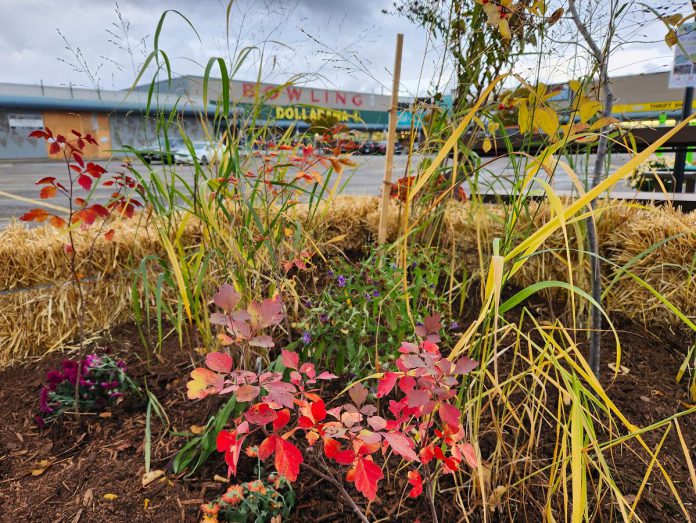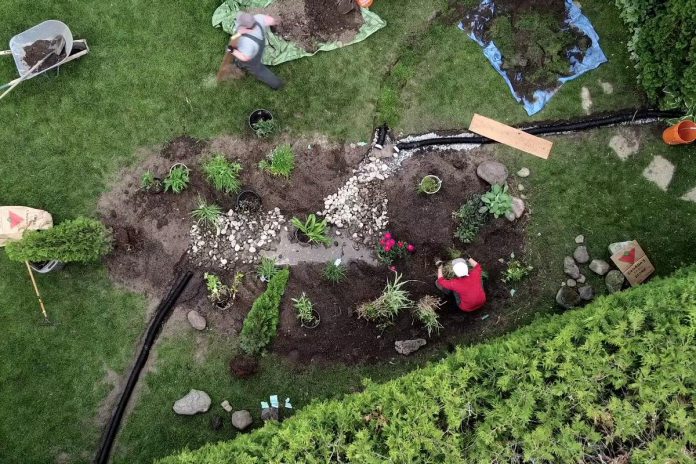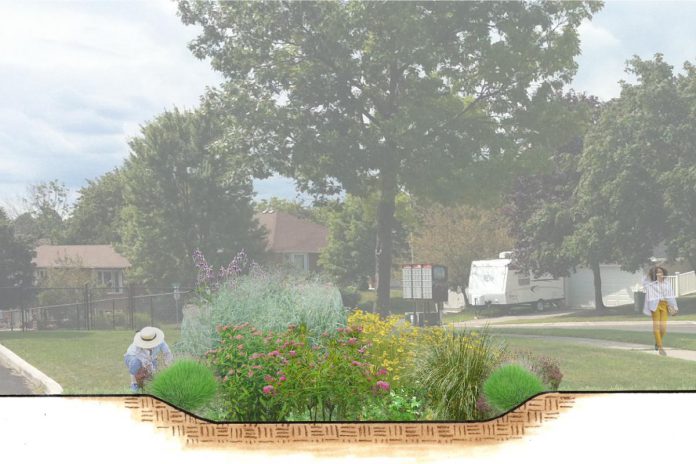
Since 2020, eligible homeowners in Peterborough have installed 155 square metres of rain gardens with support from GreenUP and the City of Peterborough’s Rain Garden Subsidy program.
Together, these gardens can collect and return about 380 cubic metres of runoff into the ground per year, a volume that would fill around 550 average-sized hot tubs.
That’s a lot of water. But why does it matter?
“Currently, only 25 per cent of the City of Peterborough’s stormwater is filtered for pollutants before entering natural waterways, such as the Otonabee River or Jackson Creek,” explains Curtis Mei, the city’s stormwater systems coordinator.
“When it rains, urban runoff (stormwater) carries sediment and pollutants from vehicles, fertilizers, road salt, animal waste, and grass clippings into these waterbodies, which pollutes natural habitat and our source of clean drinking water,” Mei adds.
Rain gardens are bowl-shaped gardens designed to take in runoff from a nearby hard surface, such as a roof or driveway. They are a type of ‘green infrastructure’. Green infrastructure refers to systems that harness living materials to provide important urban functions, like stormwater management.

The plants and soil in a rain garden absorb runoff and filter out pollutants before returning the water to the ground, diverting them from local waterways.
There are many benefits to rain gardens. They provide important habitat for native insects and wildlife, reduce the urban heat effect, and absorb excess carbon from the atmosphere. When multiple homeowners install rain gardens on the same street, it can even lower the risk of flooding during heavy storms.
The City of Peterborough’s Rain Garden Subsidy Program is entering its fourth season. The program subsidizes the cost of installing a rain garden to a maximum of $1,000 per applicant. GreenUP supports this program by providing applicants with educational resources throughout the application and design process.
There are a limited number of subsidies available each year, which are distributed on a first-come first-served basis.
This year, eligibility has been expanded to include commercial and institutional properties such as businesses, schools, and churches. Integrating green infrastructure into these types of spaces can help clean and manage stormwater in areas with a high proportion of paved surfaces, such as the downtown or other commercial corridors.
To get started with an application, participants must determine whether their property is suitable for a subsidized rain garden.

The garden must be situated at least three metres from any nearby foundations and located entirely on their property. It must be located outside the canopy of existing trees, in an area that slopes away from the home or building. Both front yards and backyards are acceptable.
As well, a rain garden cannot extend into the municipal right of way, where there are many utilities buried underground. To determine where your property ends, refer to a legal survey or consult the city’s interactive e-Maps 2.0 website.
Staff at GreenUP can help you find a suitable location for your rain garden. They can also help applicants complete the eligibility questionnaire. After filling out the questionnaire, you will be ready to design your garden and submit your full application.
If designing a garden sounds like a lot of work, consider using a rain garden design template, a new feature of the program for 2023. The template gardens are designed to suit a range of properties and garden styles and prioritize the inclusion of plants native to this area.
The templates and other resources, including GreenUP’s four-part video series on the Rain Garden Subsidy Program, are freely available on our Rain Garden Resource page for everyone to use.
Start designing your rain garden this season — the waterways will thank you!
VIDEOS: Rain Garden Subsidy Program
The Rain Garden Subsidy Program is an initiative of the City of Peterborough delivered in collaboration with GreenUP. For more information, visit peterborough.ca/raingarden, or contact GreenUP program coordinator Hayley Goodchild at hayley.goodchild@greenup.on.ca.


























